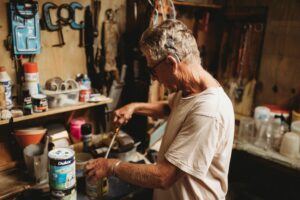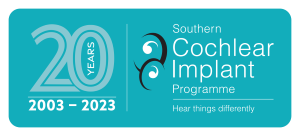
As more and more people receive a life-changing cochlear implant and hear again, International Cochlear Implant Day today 25 February is truly something to celebrate in Aotearoa in 2022.
In last year’s Budget the Government allocated an extra $28 million over four years for adult cochlear implants. The Southern Cochlear Implant Programme (SCIP) has performed 36 adult operations since 1 July, chief executive Neil Heslop says, and is well on the way to completing this year’s total allocation of 60.
“It’s brilliant that the extra funding has enormously impacted so many people and their families already. The cochlear implant technology improves their lives immeasurably and that means there’s an excellent social, community and economic return on the Government’s investment,” Neil says.
“On International Cochlear Implant Day it’s particularly important to acknowledge how the extra funding will transform the lives of many more profoundly deaf people in months and years to come,” he says.
Bruce Phillips from Pātea in Taranaki received his cochlear implant on 16 November, 2021, a day he will always remember. He had been on the waiting list for the surgery for three years.
“It’s life-changing and a blessing – bloody marvellous really,” the retired greenkeeper says.
“When I was deaf I limited what I did socially as I could not understand what people were saying. While I accepted that, it was tough for my family and friends,” says Bruce, who is 68 years old.
His deafness started about 20 years ago with a ringing in his ears, then he struggled to hear different sounds, then about 10 years ago he was profoundly deaf.
Now Bruce is back socialising at his bowling club and golf course, and talking to his three sons and three young grandchildren on the phone.
They live in Palmerston North, New Plymouth and Queensland, so for the past decade Bruce had to make do with text messages and emails.
He’s learning to adjust to his new cochlear implant every day and has regular follow-up sessions with SCIP’s post-implant rehabilitation service.
“When the team switched my implant on human voices sounded like the Daleks on Doctor Who – really echo-ey, and high and squeaky – but I didn’t mind as I could hear again!
“I came out of the building and I could hear traffic noise, which I hadn’t heard for 18 years, and immediately I was trying to work out the bird sounds – was that a sparrow, a starling, or a myna bird?
“A couple of days later I was home and I took my dog Sadie for a walk. She’s 10 years old and I had never heard her, and I could hear her claws tap tapping along the path,” Bruce says.
“Now my brain is getting used to different voices again and people don’t sound so much like robots!”.
You can read our press release about Bruce’s story here.
